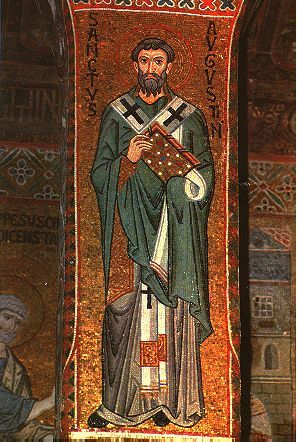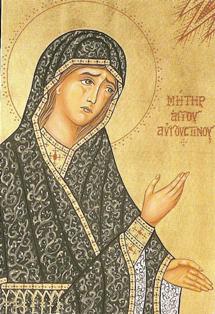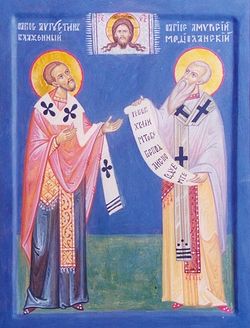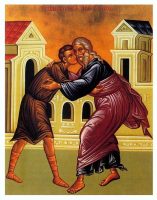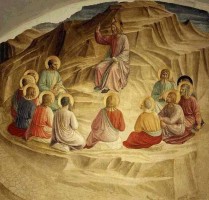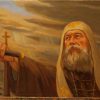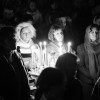Today the Holy Church celebrates the memory of Blessed Augustine, a Father of the Church who put great effort into confirming the Christian faith and especially into explicating the doctrine of God’s saving grace.
He left us many works, among which is a book he called Confessions. He addresses God in this book, recalling everything that had happened to him since earliest childhood. This book is a remarkable monument of repentance and should be the handbook of every Christian. It has been translated four times from Latin into Russian and was recently reissued by the publishing department of the Moscow Patriarchate. It is a marvelous book!
When speaking about Blessed Augustine, we also have to talk about his mother, St. Monica, for it was she who begged for him to God in prayer. His father, however, was indifferent towards religion; he spent his entire life as a pagan, being Baptized only before death, when his son, Augustine, had already grown up. They lived in North Africa, where the state of Algeria is now located. Although they were all African by origin, they spoke Latin, read Latin books, and lived as was customary for Roman citizens.
Blessed Augustine’s parents raised funds with great hardship to give him an education. He was sent to study in Carthage, where he became a teacher of rhetoric – what we would call a professor of literature. An extraordinary gifted and talented young man, he quickly forgot the primary lessons of faith given to him by his mother, and set off into the capital’s secular, noisy life. A brilliant career, study, friends, companionable gatherings, women, and theater – thus did the young teacher keep himself occupied. He had not yet been Baptized – in those days people were Baptized as adults – and his mother could only weep over him.
Once she went to a bishop and began to ask him: “Vladyka, please talk with my son, perhaps you can put him on the right track.” But the bishop replied: “No, he has not yet matured, but the time will come when a divine spark will awaken in him.” But his mother continued to insist, begging the bishop so much that he said: “Go in peace, go and leave me be; for the son of so many tears and prayers cannot perish.”
And indeed, St. Monica’s prayers turned this superficial, secular, sinful young man into a priest, ascetic, Christian scholar, bishop, and Church Father.
But the Lord led him gradually. That is why it is so important for us to read Augustine’s book, Confessions, and to know about his life – since many of us are repeating his path.
He was first carried off somewhere to the side, only later beginning to search for the truth – yet not in his mother’s faith, but in various false teachings and sects. The Manichaean sect was then very widespread (it no longer exists, but there are plenty of similar such sects). It seemed to him that it was an unusually wise doctrine that opened one’s eyes to all the mysteries of nature, the world, man, and God. Augustine wholly dedicated himself to its study, and his mother thought of him as one already dead and buried.
But the Lord was leading him. A close friend of his, a companion of his childhood and youth, suddenly died – and something strange happened. When this friend was dying, in a state of agony and fever, his parents had him Baptized. That is how it was done back then: people were Baptized on their deathbeds. Suddenly this young man came to and seemed to recover. Augustine came to greet him, embracing him and saying: “How happy I am that you have revived! I had already buried you, and that useless rite had already been performed over you.” But his friend suddenly said to him: “Never speak that way if you wish to remain my friend!” This means that during his illness, when he was unconscious, he experienced something that caused a radical change in his soul. Shortly thereafter this young man fell ill again and died.
Augustine long mourned his death, coming to understand the brevity of human life; he was faced with the question of what to do in order to live rightly. He was constantly frustrated by the wisdom of philosophers, sectarians, and teachers. He then moved to Rome, hoping to build a career there. This fell through because of the multitude of teachers all competing with one another, and so it was very difficult for someone from Africa to break through. Then he traveled to Milan, wherein was Divine providence…
You all, of course, know the hymn “We praise Thee, O God,” which we sing at every thanksgiving moleben. This hymn was written by a great saint, Ambrose, who happened to be the bishop of Milan at that time. Augustine approached him in church simply in order to pass along a letter from the latter’s acquaintances.
He came as a stranger, wanting simply to look around and to listen, but he gradually began to feel that here is a strong foundation, here is the truth, here is real life. Then he began to want to meet and speak with Ambrose personally.
Thus began their acquaintance. Gradually, and with pastoral care, Ambrose led the young teacher of rhetoric to the Christian faith. His heart was already with God and he had an intellectual understanding of the truth of Holy Scripture – yet, nonetheless, Augustine could not leave behind his former, frivolous life.
He himself recalls in his Confessions: “I cried out: Lord, save me – but not now!” He kept putting it off… But then he read about the Egyptian ascetics who, at the call of God, left everything and went into the desert. Augustine said to himself: “Here these unlearned people are taking Heaven as if by storm, while we educated people stand in back and cannot enter.”
Then once, as he relates in his book, he was sitting in his garden, tormented by confused emotions, when he suddenly heard a voice like a boy’s, saying: “Take it up and read!” He perceived this voice as an omen, took up the book of Holy Scripture he had with him, and began to read. He read words of the Apostle Paul that struck him like a sword: he learned from the Apostle that one cannot be saved without the help of God’s grace.
God, as it were, drew him in with His mighty arm, but Augustine resisted – he did not want this. Yet in the end he was compelled to yield to the Lord’s overwhelming power. He was round thirty-years-old when he renounced everything, accepted Christianity, became a monk and then a priest, and around the age of forty was already the bishop of Hippo in North Africa.
It would be impossible to list all this man did for the Church! All of Latin-speaking Africa listened to his words. His significance for us is great to this day. This man has remained in the Church’s memory, in the Heavenly Jerusalem, where he prays for us.
Today we are celebrating his feast day. In conclusion, I would like to read you several lines from his book. This is how he turns to the Lord in repentance: “Thou hast made us for Thyself, and restless is our heart until it comes to rest in Thee.” Our most sublime joy is communion with God. Our most sublime goal is to come to God through Christ. Here is how the saint puts it: “And man desires to praise Thee, for he is a part of Thy creation; he bears his mortality about with him and carries the evidence of his sin and the proof that Thou dost resist the proud. Still he desires to praise Thee, this man who is only a small part of Thy creation. Thou hast prompted him, that he should delight to praise Thee, for Thou hast made us for Thyself and restless is our heart until it comes to rest in Thee. Grant me, O Lord, to know and understand whether first to invoke Thee or to praise Thee; whether first to know Thee or call upon Thee. But who can invoke Thee, knowing Thee not? For he who knows Thee may invoke Thee as another than Thou art.”
Such was the central thing in Blessed Augustine’s long and arduous life. When thinking of the saints, we should always remember that they serve for us as lesson, exhortation, and prayer. They were people just like us, with weaknesses and sins. But they ascended on high, having conquered with God’s help, and through the power of Divine grace, all that is dark in man. Amen.
Translated from the Russian












